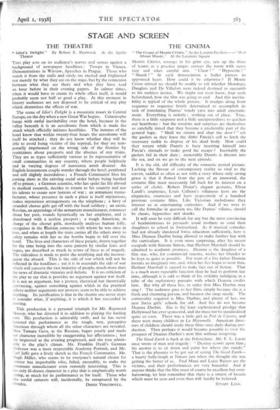THE CINEMA
• • The Count of Monte Cristo." At the London Pavilion-4. htad About Music." At the Leicester Square MONTE Camp, revenge in his grim eye, sets up the three of hearts as a practice target, crosses the room with suave step and takes careful aim. " Cheat ! " " Hypocrite ! " " Skunk ! " At each denunciation a bullet pierces its appointed heart. How could it be otherwise ? If Monte Cristo missed we should be unable to tell whether Mondego, Danglars and De Villefort were indeed destined to succumb to his ruthless justice. We might not even know, four reels beforehand, how the film was going to end. And this inevita- bility is typical of the whole picture. It trudges along from sequence to sequence firmly determined to accomplish its task of translating Dumas' windy yarn into adult entertain- ment. Everything is orderly ; nothing out of place. True, there is a little suspense and a little unexpectedness to quicken our heartbeats : but the tensions and surprises are themselves so carefully timed that they become a predictable part of the general logic. " Shall we return and shut the door ? " ask the gaolers as they leave the Abbe Farcia's cell to fetch the necessary tackle to dispose of his dead body. How could they return while Dantes is busy inserting himself into Farcia's shrouds toeTnake good his escape ? Inevitably the gaolers fail in their duty ; inexorably Dantes is thrown into the sea, and on we go to the next episode.
It is the old, old difficulty of the romantic period picture. Lacking the flavour of contemporary reality so vital to the screen, saddled as often as not with a story whose only saving grace is that it flowed from the pen of an immortal, the costume film must necessarily fall back for its interest on a series of clichés. Robert Donat's elegant gestures, Elissa Landi's courtesies, Louis Calhern's villainous leers are the elegancies, courtesies and leers respectively of a hundred previous costume films. Like Victorian melodrama they interest us as entertaining curiosities. And if we were to call the formulae in question we, like Dumas' villains, should be cheats, hypocrites and skunks.
It will soon be very difficult for any but the most convincing of headmistresses to persuade usual mothers to send their daughters to school in Switzerland. As if musical comedies had not already slandered Swiss education sufficiently, here is Miss Deanna Durbin being allowed to make further hay with the curriculum. It is even more surprising, after his recent escapade with Simone Simon, that Herbert Marshall should be admitted to academic premises. Deanna is the daughter of a film star, who, for commercial reasons, wishes her blunder to be kept as quiet as possible. For want of a live father Deanna invents an imaginary one, and, when her lies begin to wear thin, Herbert Marshall is caused to make fact out of fiction. That is a much more reputable function than he had to perform last time, although it is odd to think of his stolidity indulging in a tithe of the exploratory pursuits with which Deanna credits him. But why all these lies, in order that Miss Durbin may sing ? The audience goes to her films simply because she is a fresh and charming person, and because she sings nicely. The commodity required is Miss Durbin, and plenty of her, not new Swiss girls' schools for. old. And lies do not become Deanna Durbin. She is the least sophisticated prodigy that Hollywood has ever sponsored, and she must not be standardised quite so soon. There was a little girl in Poil de Garotte, and there were many children in La Maternelle. American direc- tors of children should study these films once daily during pro- duction. Then perhaps it would become possible to view the prospect of Deanna Durbin's next film without misgiving.
The Good Earth is back at the Polytechnic. Mr. F. L. Lucas once wrote of man and tragedy : " Destiny scowls upon him ; his answer is to sit down and paint her where she stands." That is the pleasure to be got out of seeing The Good Earth— a hearty belly-laugh at Nature just when she thought she was getting the better of us. Paul Muni and Luise Rainer arc the victims, and. their performances are very beautiful. And if anyone thinks that the film must of course be excellent but over- harrowing, let him remember that there is a swarm of locusts which must be seen and even then will hardly be believed.
STUART LEGG.














































 Previous page
Previous page